I am very good at expecting the unexpected and making plans for potential catastrophes. Whenever something good happens—or even something prosaic, like getting in the car to drive somewhere, I imagine the Worst Possible Outcome.
Flat tires. Car accidents. Incidents of road rage, of bridge collapse, of sudden and complete engulfment in wildfire. (Those last three didn’t seem too farfetched, this past decade in California. I also got really good at planning for active shooter scenarios—at work, in the grocery store, in the theater. Preparing for an impending salvo of bullets pretty much anywhere in the USA seems like wisdom rather than paranoia.)
I’ve mentioned this before but I promise, it bears repeating: I’m good at imagining bad things. But there are times when I don’t see something coming, not for lack of trying or imagination but because I didn’t understand such a thing actually existed in the universe of possibilities.
In the past few weeks, my mind has been expanded, along with my repository of Worst Possible Outcomes. One of those outcomes has to do with immigration. The other with education. More on both in a few paragraphs—first, I have a (relevant) rabbit trail to lead you down.
No matter where we all grew up, no matter how grueling or agreeable the circumstances of our various childhoods may have been, we learn the lesson early: Sometimes you do everything right and things still don’t work out.
This truth applies to relationships, to careers, to real estate, to schooling, to parenting, to all the things. You can plan and prepare. You can get lucky. You can be at the right place at the right time. You can think it’s all gonna be ok. Every single person you trust can tell you everything’s gonna be ok. And then, sometimes, it’s just… not.
Capricious gods, disturbance in the Force, fated flap of butterfly wings—who knows why. Sometimes shit just happens. Or doesn’t happen, if that’s what applies here.
In the winter of 2000, Marido and I moved 2,000 miles across the United States to San Francisco. We arrived mere hours before the onset of the new year and congratulated ourselves on our good planning and good fortune.
I had a job all lined up, writing for a swanky advertising firm in the shadow of the Transamerica Pyramid, down in the financial district. Newly wed and starry-eyed, we had stuffed our jumble of twenty-something possessions (Doc Marten boots, hand-me-down furniture, and a yellow motorcycle) in the back of a rented truck and driven for days across the frozen plains to the Promised Land.
When we curled out of the Robin Williams tunnel* in the Marin headlands and that first tower of the Golden Gate Bridge speared the blue of the afternoon sky like a harbinger of All Good Things To Come, I felt warm from my toes to my ears. I knew everything was going to be OK. I knew we had come home.
*only it wasn’t the Robin Williams Tunnel yet, because it was December of 2000 and he was still alive. At the time I called it the “rainbow tunnel” because of the prism of colors painted on the southern entrance. I guess it was officially the Waldo Tunnel for years and years, but I never remembered that. In 2015, it was named in Robin’s honor and memory and so that’s how it will be for me, forever.
Fast forward three weeks: We signed a $2200 per month lease and moved into a two-bedroom flat in the Outer Sunset. Two days later, I got laid off from my brand-new job. I didn’t know it yet, but that was the beginning of The Dot Com Bust (2001 edition), and the first of the seven times I’d be laid off throughout my California copywriting career.
Marido had been leisurely looking for the job of his dreams, but now that we were 98% broke, having spent all our modest savings moving ourselves across the country, he sped things up and snatched the first job he could find. It wasn’t According to Plan. It wasn’t how things were Supposed to Be. We had done everything right, we thought. What was happening?
What was happening was that the universe didn’t/doesn’t revolve around us, and larger forces were at play. But back then (and still to this day, let’s be real) we imagined ourselves as the heroes of our own fascinating adventure story, and we were shocked when the narrative didn’t spin out quite the way we thought it would.
It’s so very human to center ourselves and our own personal dramas, to expect the spotlights to shine our way. I mean, here I am trying to write our latest adventure into the annals of the Internet. Clearly I’m not disabused of this notion.
In the instance of that first Great Layoff, I truly thought it was all about me. Not the economy or tech bubble or capitalist hubris. Me. I wandered the sandy trails in Golden Gate Park for hours, contemplating all the whys and wherefores.
Eventually someone told me, in that poetic (and slightly high) tone of so many San Francisco stories, that the city itself was testing me. It wanted to make sure I was worthy. “Everyone who moves here from somewhere else—and that’s most of us,” he said, “everyone has a story about something that went really wrong when they first got here. But if they were committed, if they wanted to be a San Franciscan badly enough, they found a way to stay.”
I took that ridiculous poetry to heart. If San Francisco wanted to see how badly I wanted to stay, I was ready to prove my devotion. We both were. So we found a way. We made it work. For 20 years, we were committed. And now our allegiance has shifted. A new dream has claimed our devotion.
At this stage of my life, I’m less prone to anthropomorphizing cities than I used to be. So I don’t believe that Portugal or Setúbal is capriciously testing my level of wanting-to-be-here.
But I do believe that being an immigrant is difficult, even when you’re a privileged American immigrant whose relocation was triggered by desire rather than necessity. Many of those difficulties you can prepare for, but there are some you will never see coming.
Such is the story of the last few weeks of our lives.
Because the US Postal Service lost an important piece of my mail way back in March, the immigration process for Marido and Filha has been different (and speedier) than my own. In the States, their D7 visas were issued much earlier, and in Portugal their SEF (Serviço de Estrangeiros e Fronteiras) reviews were held in Lisbon in early August, with their all-important residence permits (título de residências) arriving one week later.
The arrival of my D7 visa was a nail-biter, leaving me sleepless and anxious right up until the last minute in San Francisco. My in-person SEF review was held in September, in a chaotic loja da cidadão (citizen’s shop) in Agualva-Cacém, northwest of Lisbon.
The appointment itself went well—I was approved for residency. The next day, I left for San Francisco to retrieve the FeeBea birb, buoyed by the thought that my Título de Residência would be waiting for me when I returned.
It was not.
A few more weeks went by, with me jumping to attention whenever the CTT man rang the doorbell. But he was never delivering the envelope I was waiting for.
“Maybe it’s taking longer because your appointment was at a different office,” Marido conjectured.
“Maybe SEF is just a lot busier in September than they were in August,” he hedged.
“The card will come, don’t worry,” he soothed.
After six weeks and the onset of October, I pulled out the receipt from my SEF visit. I had looked at it several times, including immediately after receiving it at the close of my appointment. This sheet of paper is similar to the one the DMV gives you in the United States when you get a driver’s license. It has all the pertinent information on it, and you can use it until your “real” card arrives. It’s official, but it still feels flimsy and tentative.
I scanned the paper, looking for some reference for when my card might arrive. Had the woman behind the glass at the loja told me how many weeks? Why couldn’t I remember?
And then I saw it: the house number listed as my address. It was the number 10, instead of number 19. My stomach plummeted and kept on falling, two stories down to the ground.
The wrong address. They had input the wrong address! How could they have done that? How could I have not SEEN it?
I fumbled my feet into my shoes and slapped out the door, running around the square to find #10. Was it perhaps Germinia’s cafe? Might it be a neighbor I sort-of know, someone who might recognize my name and accept the mail on my behalf?
But no. Number 10 was nowhere to be found. I saw #7, #8, #9—all nearby apartments. And then the cannabis shop: #12.
I contemplated my options. I tried calling all the numbers for SEF that google would give me. (No answer.) I sent emails. (No answer.) Finally, a fellow immigrant on a Facebook page suggested I go back to Agualva-Cacém.
“I guarantee your card was returned to them,” he said. “They probably have a drawer full of returned cards.”
I was skeptical, but out of ideas. And I’ve only been here a short while, but I’ve already learned that you get things done much more quickly in Portugal when you go in person instead of calling or emailing.
So I typed up a note and translated it to Portuguese: “I am here to pick up my Título de Residência, which was returned in error by the CTT.”
I drove the 67km with knots in my gut. If this didn’t work, I wasn’t sure what to try next. My visa had expired at this point, and I didn’t think my paper receipt would hold up all that long for border crossings. I had been planning to go to Illinois in December, to check on my mom. What if I left Portugal and then I couldn’t get back in? Of course I was imagining all the worst possibilities. Just to be safe.
But the worst never happened. My 16-point-Times-Roman note got me through the doors, up to the SEF counter, and into a conversation with the stone-faced woman behind the glass.
No, I didn’t have an appointment, I told her. I struggled with my rudimentary Portuguese for a moment and then gave up. “Posso falar em Inglês?” I asked. “Is it possible to speak in English?”
“Não,” she shook her head. She locked her gaze with mine and repeated herself. “Não. Não falo inglês. Por que não fala português? Já não estás nos Estados Unidos. Está em Portugal. FALA PORTUGUÊS!” (No. I do not speak English. Why don’t you speak Portuguese? You are not in the United States anymore. You are in Portugal. SPEAK PORTUGUESE!”)
My Portuguese is mal, but I understood her just fine. It took my breath away for a second. Oh. Oh! That’s what that feels like. To be called out as other. To be told to speak the native language. To get that disgusted, impatient shake of the head. And here I thought only asshole Americans did that kind of thing: You’re in America, SPEAK ENGLISH!
I curled my shoulders apologetically. I held up my printed-in-Portuguese note. “Desculpa,” I murmured. “Sorry.”
She huffed a sigh, snatched the note, and yanked open the drawer to a file cabinet. Inside, I could see rows and rows of business-sized envelopes emblazoned with the red CTT logo. Returned residency cards, neatly alphabetized. She thumbed through the Ws, pulled out an envelope and efficiently sliced it open with a manicured nail.
There was my card, shiny and new. She slid it across the counter. “Assinatura,” she pointed. I signed.
“Tudo?” I asked hopefully.
“É tudo,” she waved me away. “That’s all.”
And that was that: the first of the two big Didn’t See That Coming things of the last few weeks.
The second of the Unexpected Near-Disasters was even bigger, because it wasn’t about me. It was about Filha.
In my last, buoyant, everything’s-gonna-be-ok post, I wrote about how school—a new school, in a new country, in a new language seemed to be working out for Filha.
Two Monday nights ago, Marido and I were sitting at the newly-purchased dining table in our kitchen, making plans for the week. Our first visitors had arrived from the Bay area the Saturday before, and we were determined to make the most of our time with them. M&A, also known as the Uncles, are very dear—M was Marido’s roommate in college, and the best man at our wedding. Years later, Marido officiated at M’s wedding to A. So we go way back. We were so excited to have them visiting—showing old friends around our new European home made it feel more real, somehow. Made it feel more ours.
That night, we had just returned from a day trip to Èvora—Filha attended school while the rest of us explored Capela dos Ossos. So there we sat, feeling like we had a handle on things. Marido was scrolling through his email when suddenly his face blanched and he looked up at me, eyes wide.
“Oh my god,” he said, and my queasy heart tripled time.
He spun his laptop to face me and I saw what he had just translated—an email from Filha’s school saying they were closing in two weeks time. “Suspensão de funcionamento,” the subject line read.
“We deeply regret the inconvenience caused to students and families. We did everything to avoid, but it was not possible in a timely manner.”
The translation was clunky, but we got the message. By October 30, Filha would have nowhere to go to school.
Tears were shed. Mine, with a tinge of panic. Filha’s with frustration. “I was just starting to get used to it there,” she cried.
My panic stemmed not only from my concern over Filha being forced to make yet another huge change in a year full and overflowing with changes, but from the lack of real options.
We began our search for a school in December of 2020, a full six months before our move. We looked at all the options: public, private, and international. We ruled out international first, for two main reasons. First, we wanted to Filha to learn Portuguese and second, we wanted her to make friends with Portuguese kids, not just British and American ex-pats who were living in Portugal for a year or three.
Then we ruled out public schools. That was a tougher decision. Filha attended public school in San Francisco and loved it. We had an extremely positive experience with teachers, administration, and other students, and we were happy to support the local public system.
But as an introvert without fluency in Portuguese, Filha would be at a distinct disadvantage in the public school system here. The schools are larger than private or international schools, and the classes are larger; we did not believe she would thrive.
So we looked at private schools. There are (were) three private schools in Setúbal. I corresponded with all of them in January and February, and we visited two of them just days after arriving in Portugal in June. By mid-June, Filha was registered at our top choice—the school with the goats.
Now, that school was shuttering (the reason given was lack of available teachers, but we suspect financial issues that were probably present long before this fall), and we were scrambling. I reached out to the other school we had toured in June. Their 5th grade was full now, they said, but they would see if they could maybe find a place for Filha anyway. They’d get back to me. (I still have not heard from them.)
I knew another American mom whose son attends the third private school, and loves it. The morning after we got the news about Filha’s school, I met this mom and several other parents from the school and they tried to help by talking with school administration. For about an hour over morning espressos and chá, they speculated that there was one spot left in 5th grade. But then a text arrived from the school director, dashing all hope. There was no room for Filha at that school, either. I wrote an email asking if she could be put on a waiting list. (I still have not gotten a reply.)
In desperation, I went to the public school we are zoned for. After attempting to talk to four or five different people, none of whom spoke English, I slumped into a chair in tears and tried to get my shit together enough to type out a message on a translator app. I wasn’t full-on panicking, but I’d say my panic percentage was nearing 83% that morning. I watched the students arriving for class, stared at the lanky 17-year-old boys and thought, “She can’t go here. Filha isn’t ready for this. What am I doing?”
I stuck it out long enough to talk to someone in administration, with the help of a 22-year-old French tutor who spoke some English. Turns out I was at the wrong school, anyway. Despite multiple people assuring me this was the right school, the school itself said it was not. I figure they know what they’re talking about. I offered my sincere thanks (I can speak enough Portuguese to do that well, at least), and gave up.
I was googling online schools as a last resort when I got a WhatsApp message from another American mom who lives the next town over. Her neighbors were sending their kids to a small private school a few kilometers away, she said. They loved it. I should check it out.
Because the school is situated outside of Setúbal proper, I hadn’t heard of it before. I sent an email inquiry and just a few hours later, my phone was ringing. It was Marina, from the school. She apologized immediately for her poor English (it was very good English)—she had learned by watching American movies, she said.
Turns out her school had already accepted two other kids from Filha’s now-defunct class (familiar faces!) and they had one spot left. It was ours if we wanted it. The three of us (plus FeeBea) piled in the car and drove 22 minutes for a tour, at the end of which we said, “Yes, please, we want the spot.”
The school is vibrant and cheerful, with a palm tree logo and bright green uniform shirts. They don’t have goats but they have a garden, and on Tuesdays, Filha will have swimming lessons as her last class of the day.
Most importantly, as we walked throughout the school, kids of all ages came hurtling down hallways to throw themselves at Marina. They hugged her about the legs, the head. She is obviously and effusively beloved. I can see why.
Two days ago when I re-visited the school to turn in all the registration paperwork that I had spent hours translating from Portuguese, answering in English, and then re-translating to print on the forms, Marina pulled me into an empty office.
She wanted to review all the paperwork with me to make sure I understood what I had signed, to check and see if I had any questions. Since I’m not anywhere near fluent in either the language or the school protocols in this new home of mine, I was grateful. I was even more grateful when, at the end of our time together, she looked me in the eye and said, “Before you go…”
“I want to make sure you understand. I think you do, because you seem like you do, but I want to make sure,” she said, pausing to find the right English words.
“It’s going to be a hard year,” she continued. “For your daughter, for you, for us at the school. She’s starting her second new school in a new home and she doesn’t speak the language yet. It’s going to be hard.
“So what I’m asking you is if she comes home and she’s crying or she’s complaining and she says, ‘Oh, I don’t like this at school’ or ‘Oh, this thing is so terrible,’ I want you to let me know. Because we want to help her. We want her to be happy and do well. And I know you want that for her, too. So if you tell us what is going on and we tell you what is going on, together we can make sure she is ok.”
I’ve lost count of how many times I’ve cried over my daughter’s school situation in the last two weeks, but those particular tears were tears of hope and relief.
This summer when I signed Filha up at the first school, the secretary could tell I was nervous. “She’ll be fine, don’t worry!” she told me cheerfully. “Kids adjust! She’ll be fine.”
It’s not that it’s untrue, the oft-flung about saying that kids are resilient. They are. They do adjust. They learn things more quickly than us adults do. So it’s quite likely that Filha will, in fact, be fine.
But I appreciate the honesty from Marina—that getting to the point where Filha is fine is hard. That it takes work: from her, from us as her parents, and from her school. That we’re not going to gloss over the fact that this time in her life is a pretty big deal.
Filha’s first day at her new-new school is next week, November 2. I’ll let you know how it goes, though I can’t promise when, exactly. I have been trying to write this post for days and days. The words have been slow in coming.
There are so many other things going on, too, that I haven’t even crammed into a sentence. Marido and I have a (cryptic statement warning) huge real estate thing we’re working out that I’m not ready to talk about yet. I’ve started working again, freelance writing for two separate clients, and so far it’s been messy. I created a daily schedule for myself with neat little time slots for school drop off and client writing and book writing and newsletter writing and errand running and house cleaning and dog walking and language learning.
And yeah, that schedule is bullshit. Nothing is staying within its allotted square. It’s all squishing into and over each other. Some stuff isn’t getting any attention, at all.
I know there are other newsletter writers out there who post religiously every week—every day, even. But I don’t think that will ever be me. I was feeling really good about my average of two newsletters a month, but then the last few weeks happened and I’m barely sliding one October post in under the wire.
It’s important to me to write it out, though. Writing is how I process my own feelings, much of the time. But also I want to remember. I want to read this post three years from now and think, “Ah yes, that was a hard time!” And I want to let my friends who are reading this know what’s happening because I can’t zoom call all the time. And then there are all of you readers I haven’t even met, people who have become invested in our story, a little or a lot or just for kicks. I want you to know what happens next! So I’ll keep writing here, however often as I can.
Maybe, once we’re truly settled and sorted (and schools aren’t suddenly shutting down), the pieces of my life will drop into their time slots more neatly. Maybe. I mean, life hasn’t been neat and tidy since COVID knocked the world off its axis. And maybe it wasn’t, even before that. Maybe I’m remembering it more kindly than reality.
Whatever the truth is about life in the before-times, life now, just four months into a transatlantic transplanting, isn’t going to be staid and predictable. The unexpected is going to keep coming for us.
Last week when we were exploring Èvora with the Uncles, Marido had to pause to take an important (real estate thing) phone call in the middle of the afternoon. We found a gorgeous little park to pause in (Jardim Público), and he plugged into zoom. I wandered amongst the trees, staying just within earshot.
Around one shaded corner, I ran into this gorgeous stone bench, bedecked in blue and white azulejos. Just like that, I was enchanted. Finding that bench reminded me that we don’t have to have neat little blocks of time for inspiration, for tranquility. It can all bleed into and over each other. We can find the beauty in the midst of the mess or the chaos or the uncertainty. It’s there, all around us, if only we keep our eyes open.
The thing is, the good stuff doesn’t always look the way we thought it would. I thought we had found the school Filha would stay in through 3rd Cycle (9th grade). There were goats! It was a sign!
And that’s the other thing—I think my religious upbringing conditioned me for a certain kind of magical thinking. For sign-seeking. For years, I was taught to accept nothing less than “God’s will” for my life. Should I go to this college or that? What was God’s will? Should I date this boy or stay single? What was God’s will?
I called bullshit on that way of thinking long ago. I no longer contort myself into painful shapes to please some supposed deity.
But still, far too often, I find myself saying something was “meant to be.” This or that thing worked out fairly painlessly, so it must have been meant to be.
I call bullshit on that, too. Maybe when I die and return to stardust, I’ll find that it really was some great plan of Fate, after all. But without that cosmic enlightenment, I’m going to say that it all comes down to choices.
We chose to move to San Francisco, and when I lost my job, we chose to stay and make it work.
We chose to leave San Francisco for Portugal. And last week when Filha lost her school, we chose to find another way to make it work.
You make choices and you take steps forward. Sometimes you have to step backward, or sideways. And sometimes you just close your eyes and jump.
As the Portuguese say, “Quem não arrisca não petisca.” Literally translated, that means: “Those who do not risk, do not have a snack.”
To me, the heart of the meaning is this: If you don’t take a risk, you will not reap the benefits. If you don’t take the leap, you’ll always wonder.
So until next time, here’s to leaping. And side-stepping. And tripping.
And getting back up to try, try again.
Copyright © 2021 LaDonna Witmer





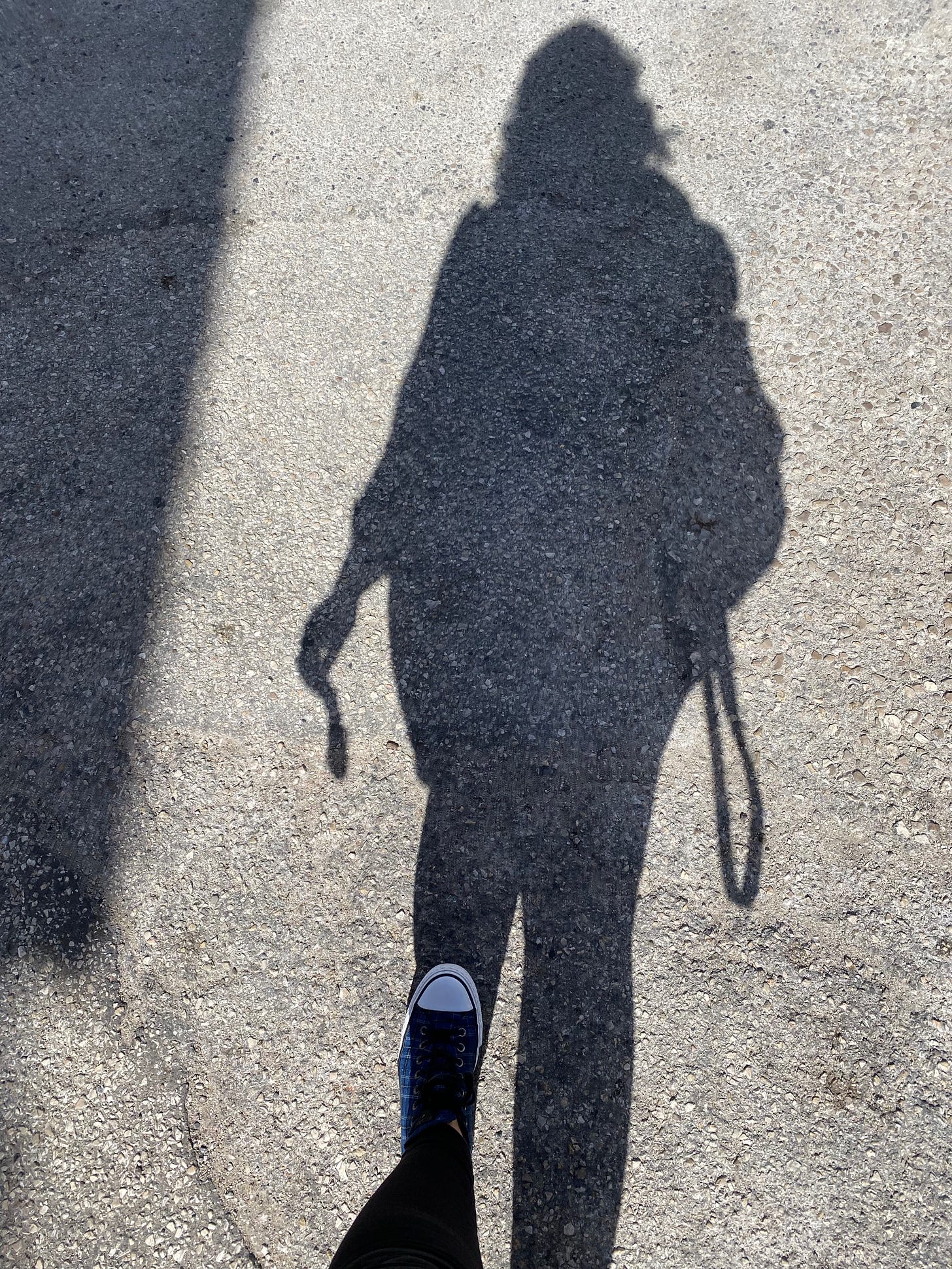

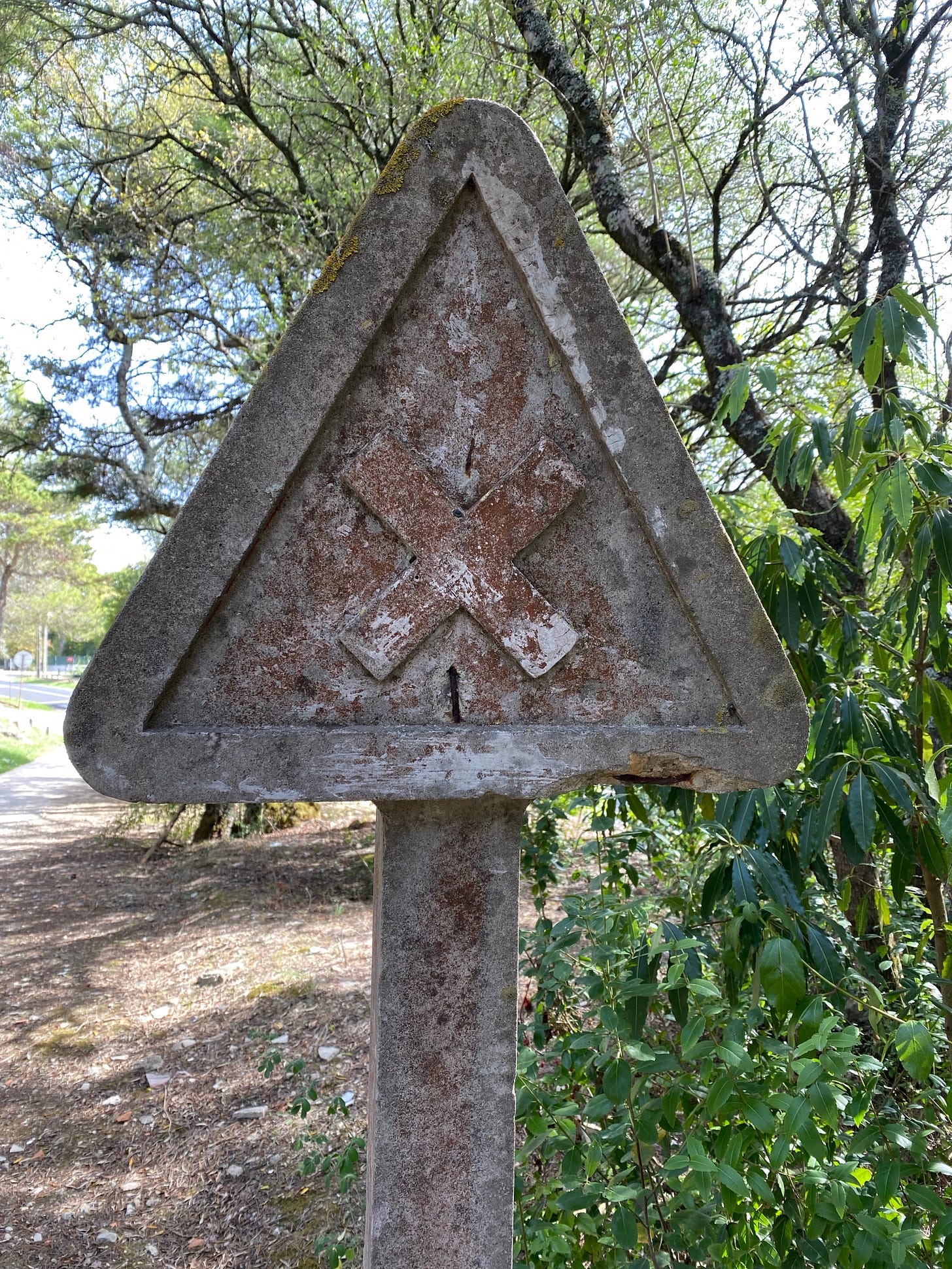
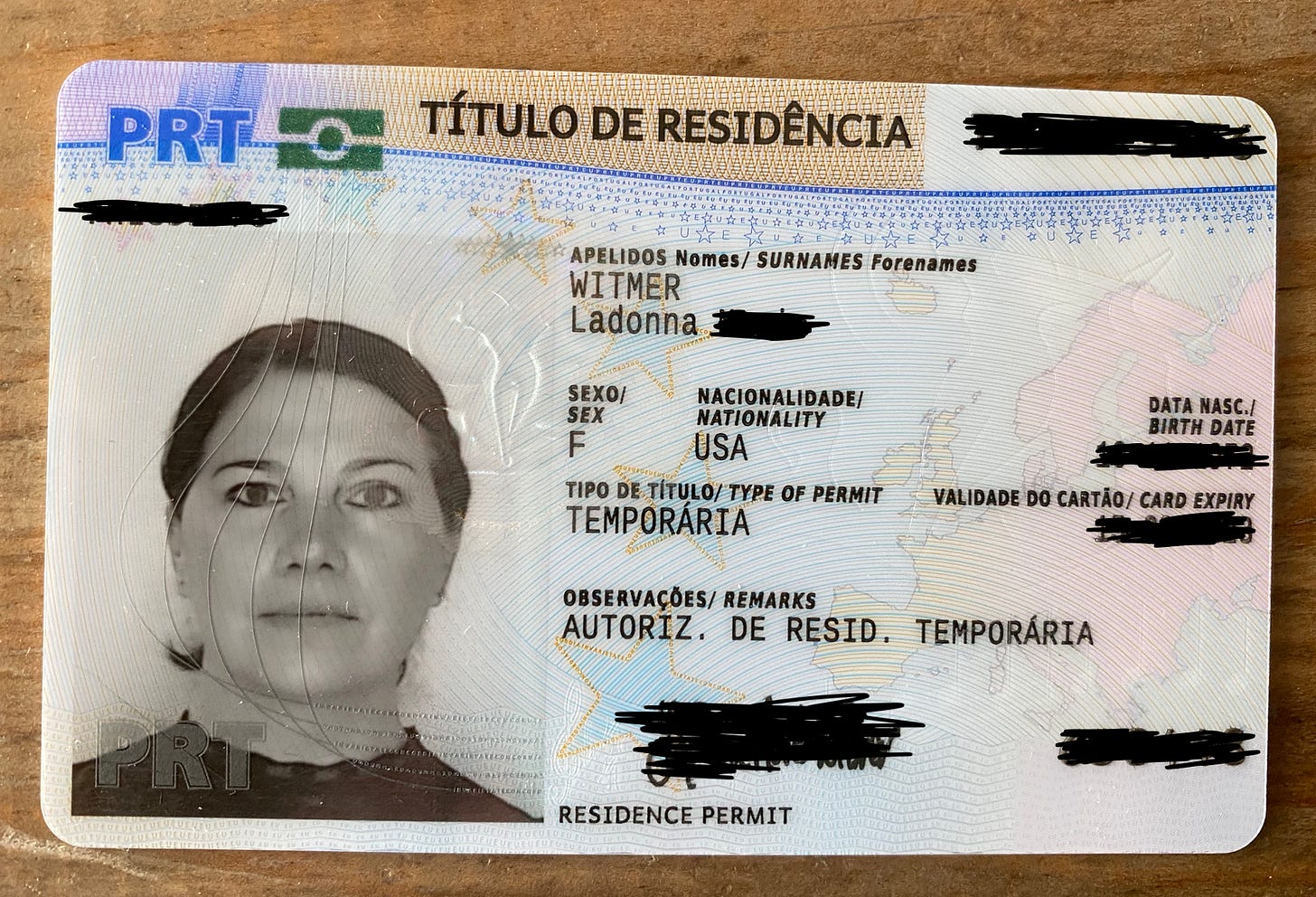
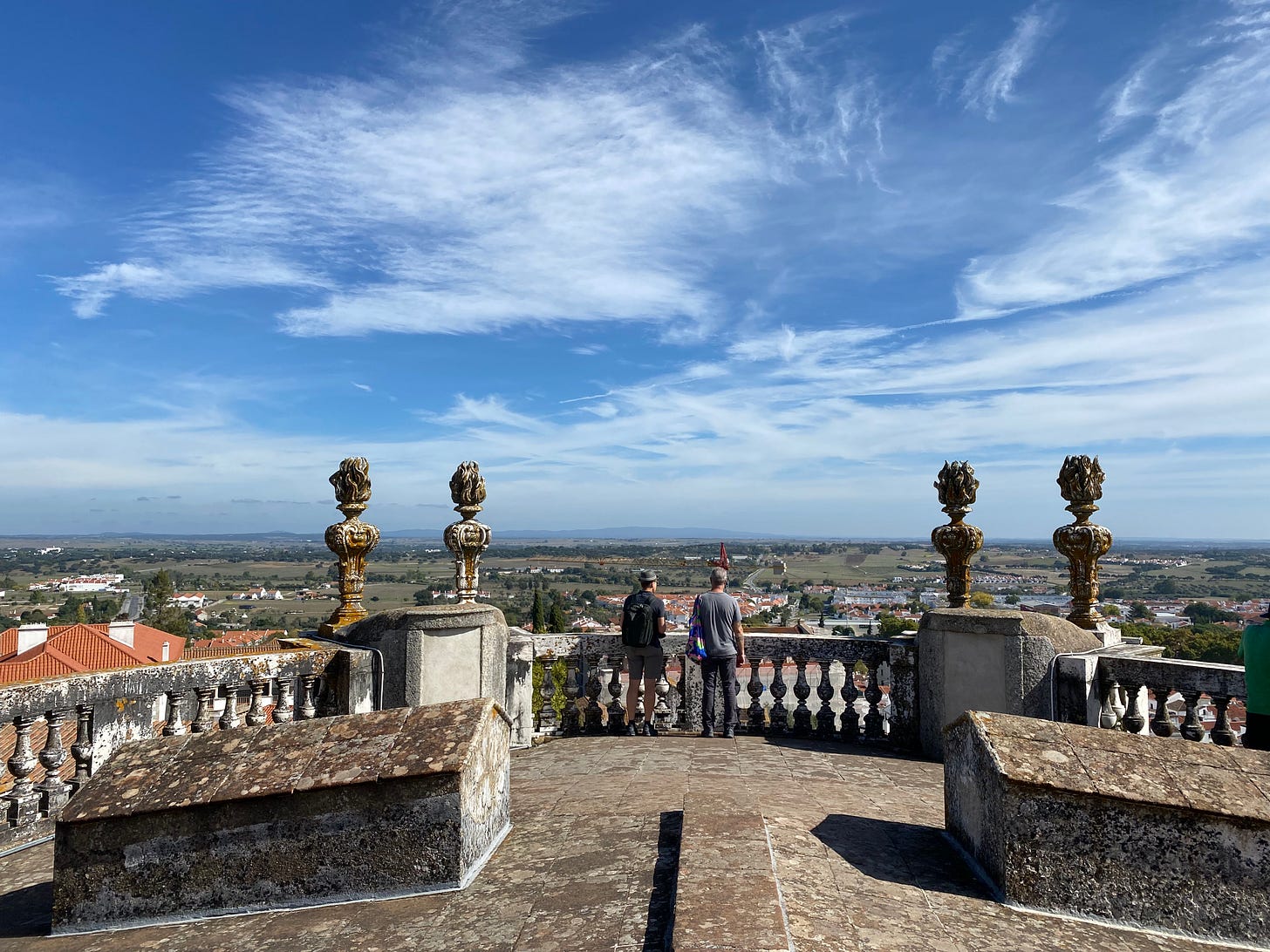

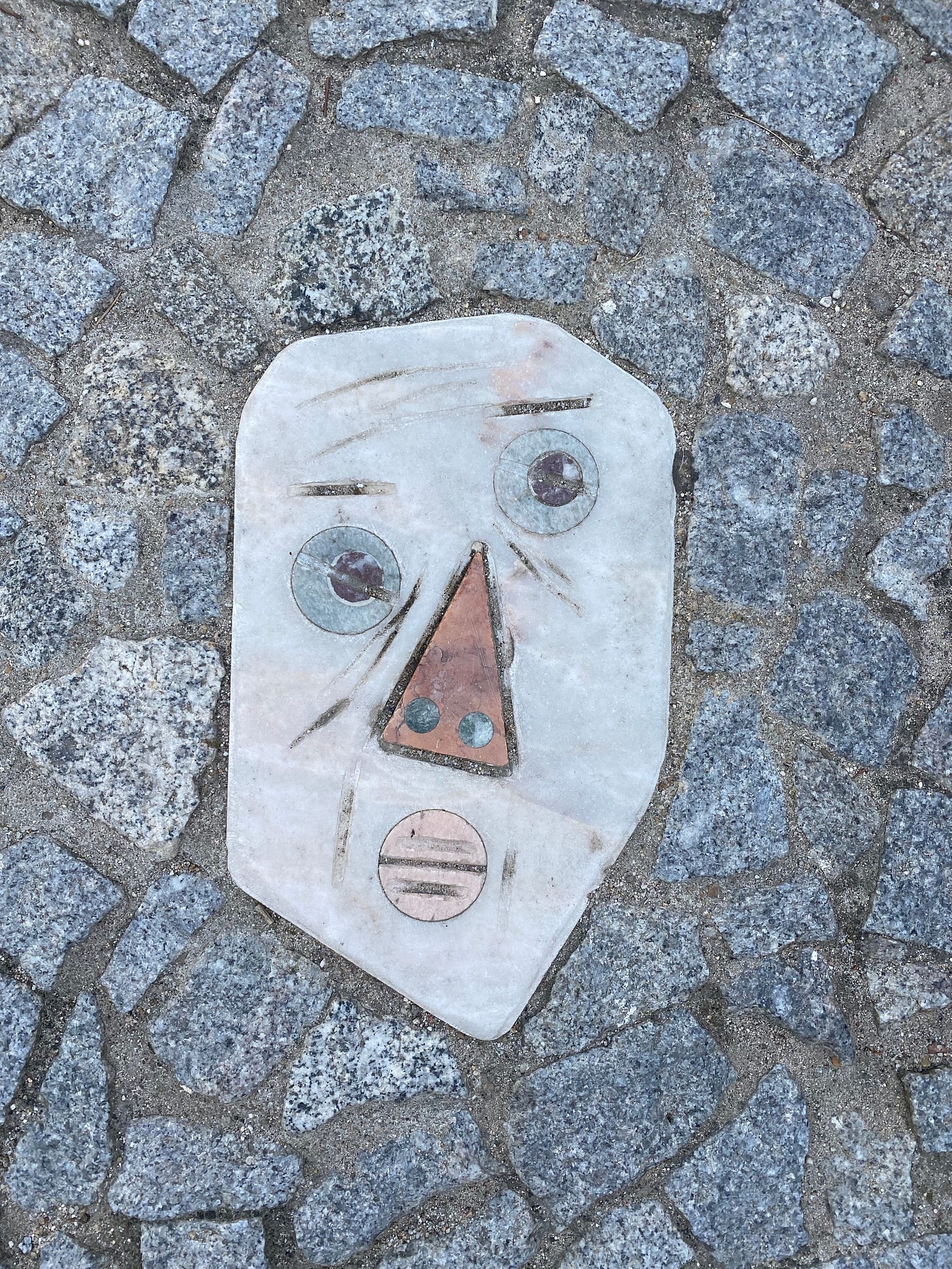
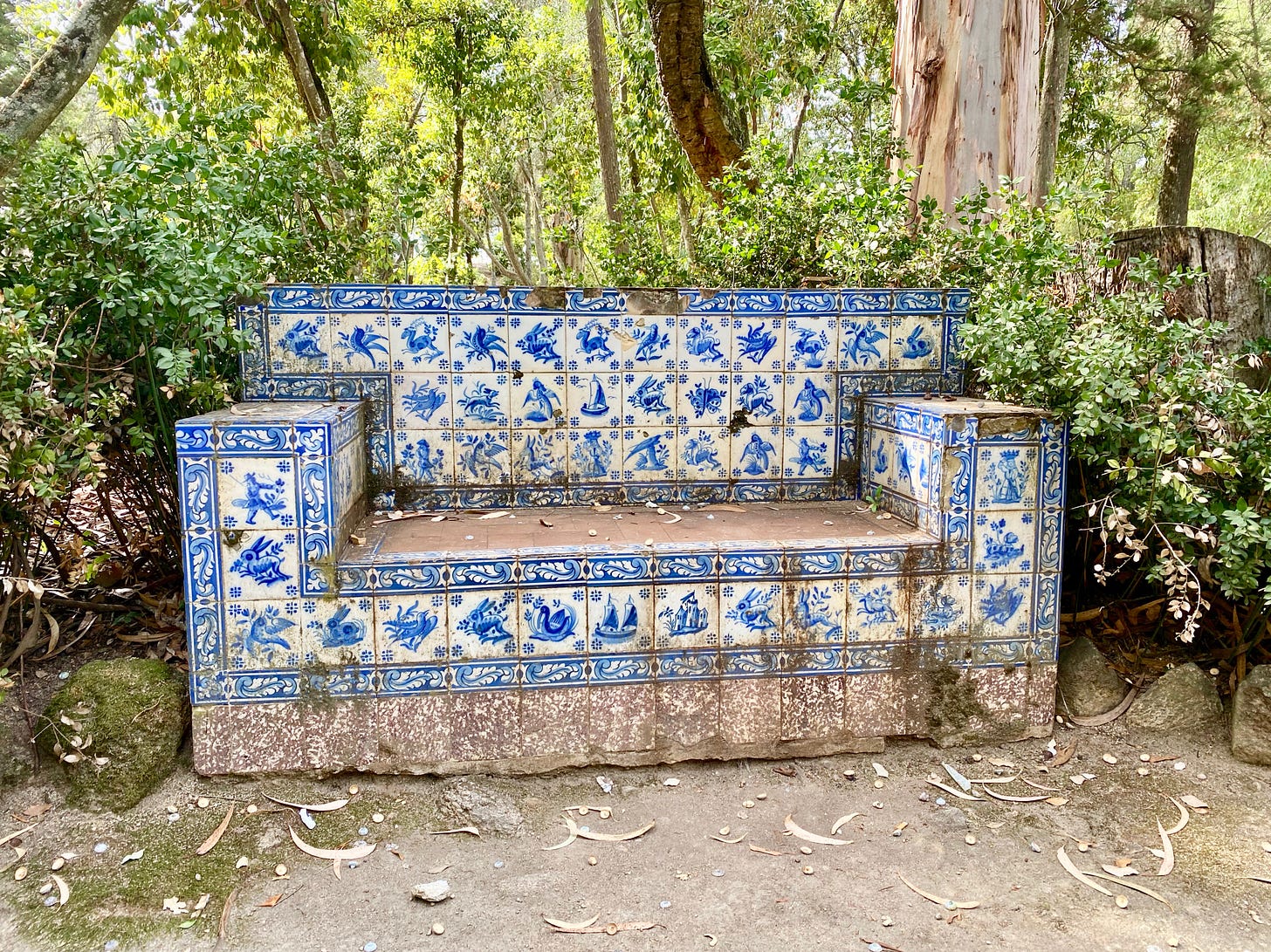
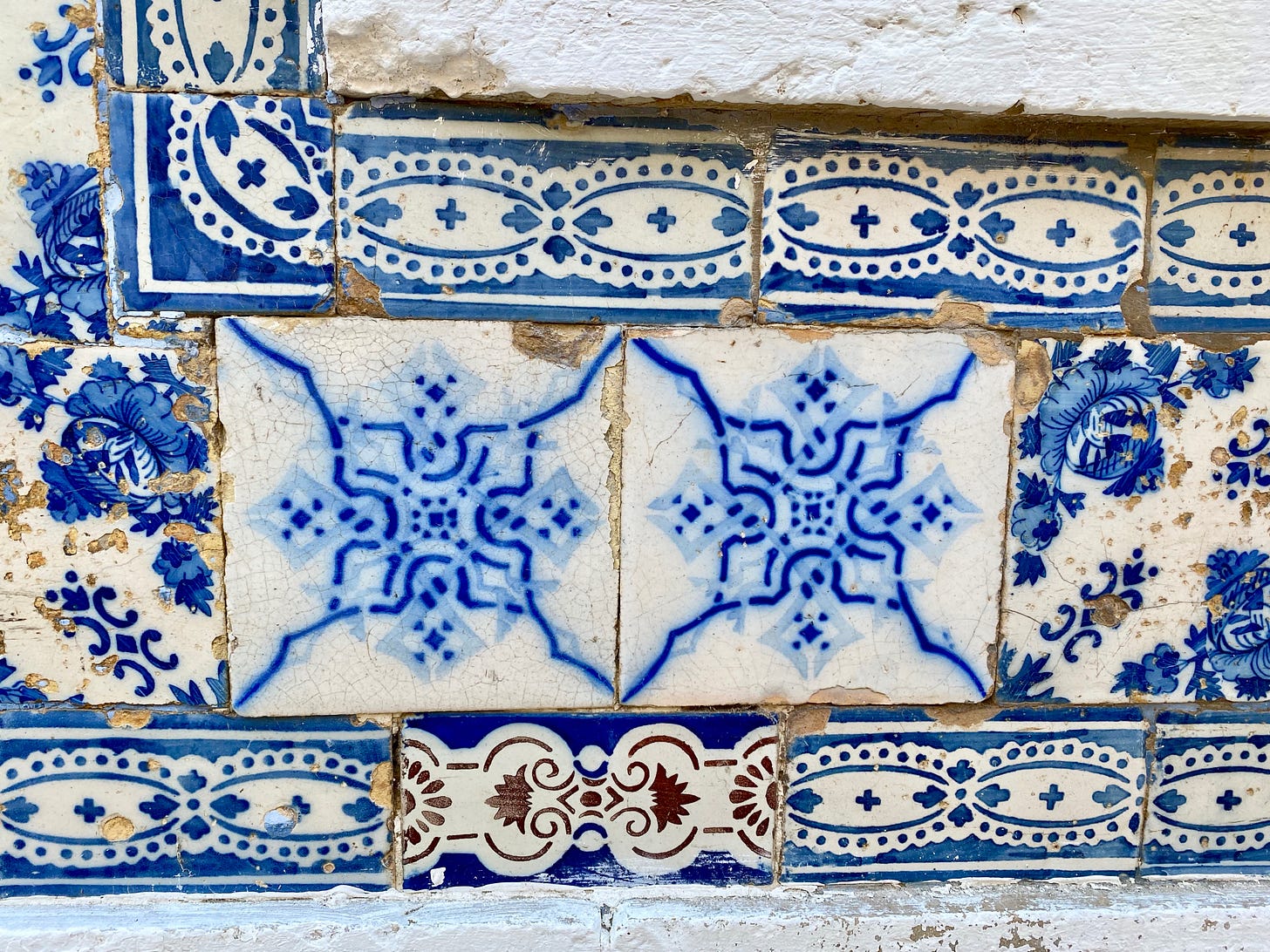
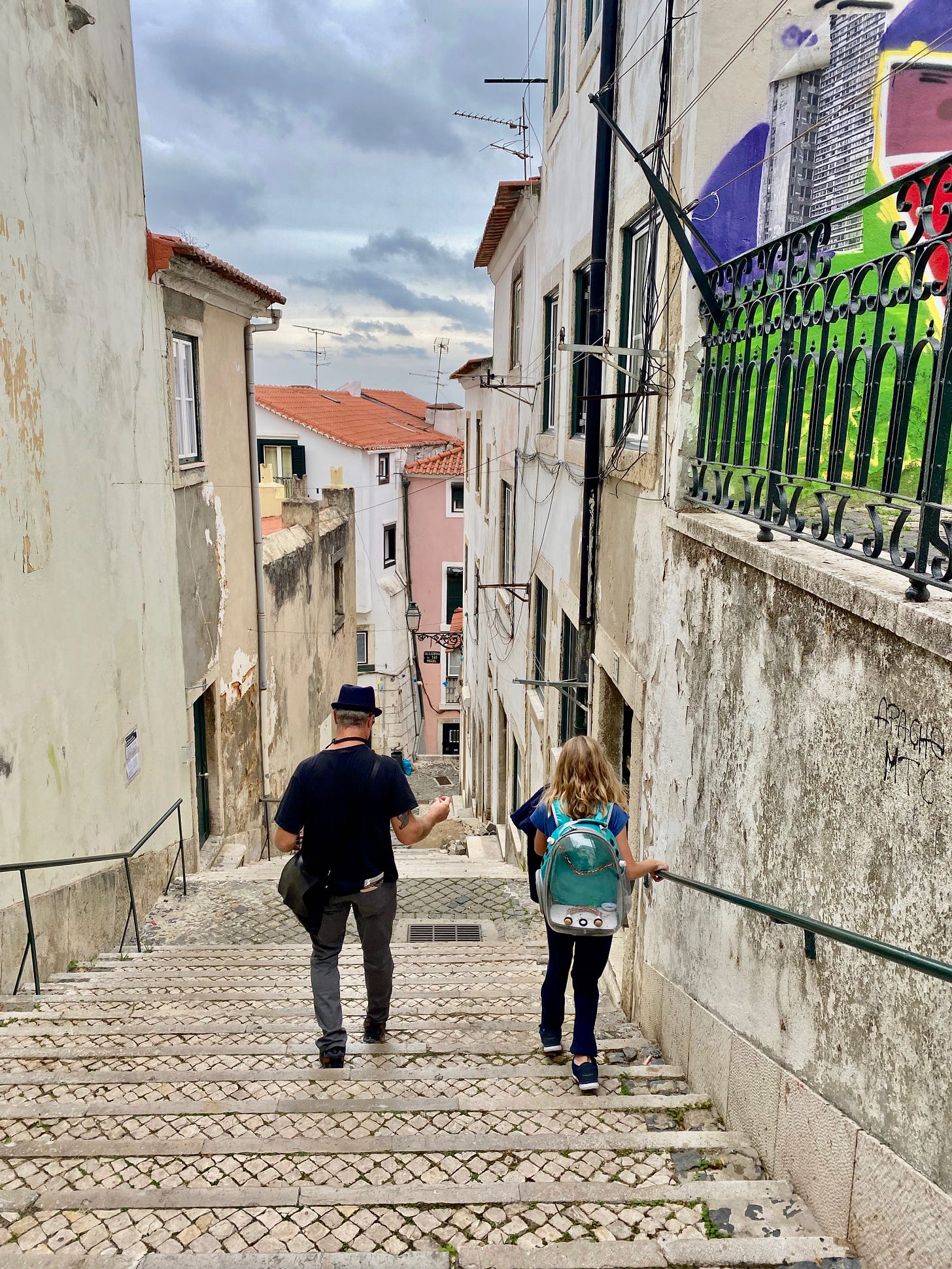
Mam: I´ve just subscribe your newsletter just to say how much I appreciate your writing. I hope you forgive my english but, as a portuguese, I´m glad that you have chosen my country to be your new home. I wish you and your family all the best and, as we say, "tudo vai ficar bem" (everything is going to be alright). I do hope so!
As I read your post today (on my birthday), I felt like I had just visited with a friend over a cup of coffee. You have such a gift for expressing your feelings that I always feel like we have had a face-to-face conversation after I complete reading the post. Because of COVID, I have very few of those conversations, and I miss them. I teach Spanish at a community college, and my students talk about duolingo.com a lot and really seem to like it. Part of the "secret" to learning another language is learning vocabulary, vocabulary, vocabulary. Even if you just use the infinitive of a verb without the correct conjugation, you can usually get across meaning. So, fill your toolbox of Portuguese words and then, perhaps, you can remember SOME of them when you need to use them. Use flashcards or whatever works for you, but keep working just on the words. Worry about the syntax AFTER you have put more tools (words) in your toolbox. It truly distresses me when I hear a non-native speaker of English struggling, and the person they are talking to is showing NO tolerance or understanding whatsoever. My son has cerebral palsy, and he has dealt with this impatience his entire life. You will look back on these days later, just as you do at the days when your daughter was little, and see the lessons learned and the shift in your paradigm from these experiences. KEEP writing. You made my birthday a good day.